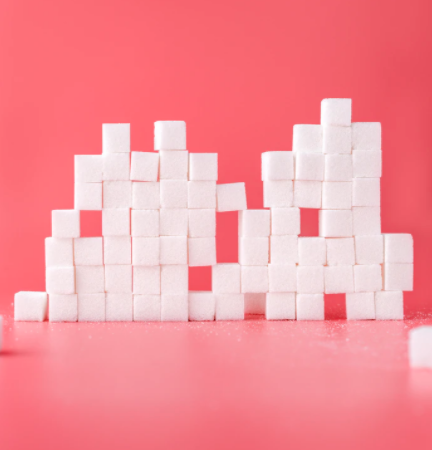Will a reduction in sugar lead to more grumpy online shoppers?
- Meyrick Consulting

- Mar 2, 2021
- 4 min read

It appears ingredients we have known and loved since the beginning of time are being increasingly examined for their dietary and environmental credentials.
There has been much debate about the amount of sugar in our diets and various campaigns to exhort consumers to make changes. However, I wonder if many people have given much consideration to the environmental impact of a basic staple that is sugar?

Although a lot of the UK’s sugar production centres around sugar beet it still uses a considerable amount of water alongside carbon emitted in its production. This impact is generated for something we can all probably live without and perhaps should reduce considerably.
Photo: Mae Mu
Sugar production is something food ingredients company, Kerry, is very concerned about.
Kerry is a highly significant player in taste and nutrition with a grand mission to ‘Inspire Food and Nourish Life’. Kerry’s m.o is to make a ‘greater, more lasting difference in the world by inspiring innovative, natural and sustainable taste and nutrition solutions for consumers, customers, the industry and the world. To this end they have published a report entitled ‘Innovative Taste for a Better Life and Planet”.
How little sugar would you tolerate in your favourite brands?
This technical report explores life cycle assessment to interrogate the nutritional and environmental benefits of its own sugar substitute ‘Tastesense Sweet’. Kerry has discovered that by using this ingredient manufacturers could make huge reductions in sugar consumption well before the consumer is involved. In fact, they have found that a 30% reduction can be achieved without compromising flavour. In addition, the sustainability question is also improved. This breaks down as a 30% water use reduction a calorie reduction and a drop of 20% in carbon emissions.

If you are unimpressed by the figures, then perhaps look at them from another perspective.
This 30% reduction would be equivalent to:
· a 68 billion sugar cube elimination
· a calorie intake reduction equivalent to 1.8 trillion hours of cycling which burns calories,
· a reduction of 29,800 cars from the road for twelve months with its resultant carbon emissions reduction,
· a reduction in water usage by about 11 million peoples’ annual showers.
Does that sound more impressive? Photo: Coen van de Broek
It appears that many people are not prepared to ‘shop in ignorance’
This is a granular approach of course, (see what I did there?) that would have seemed extraordinary even twenty years ago. However, manufacturers are responding to consumers’ demands for more transparency and information about their purchase decisions. With landmark tv series like ‘Blue Planet’ and other David Attenborough documentaries the full impact of human behaviour is evident. It appears that many people are not prepared to ‘shop in ignorance’ any longer and manufacturers must respond.
Many of our staple ingredients are being tweaked

Photo: Anna Pelzer
Although sugar has always been an easy target many of our go to ingredients are under scrutiny. Many people are far more interested in food provenance, nutrition and the environmental impact of our food choices. How many times have you looked at the packaging your salad contains and wondered if there’s an alternative to generating so much waste?
Now the future of online shopping wars is here
Also as lockdown measures show some signs of easing sooner rather than later, it will be interesting to see whether some of the habits we have created will be sustained. An interesting behavioural change has been the increase in online shopping which has risen by
Ocado may well have got complacent as its early adopter advantage wears thin

This rise has been fuelled by its adoption by the older demographic who have discovered the ease and convenience of the online shopping experience. However, in a recent service, perhaps surprisingly., Ocado was rated as worst for customer experience in a consumer survey that was published by The Grocer.
People still want a more human response online
This is pertinent on so many levels. Ocado have been pioneers in the online shopping sphere and their automation and use of technology is more than impressive. Yet, the more we get used to the shopping experience the more we want from it. Not only do we want deliveries at our convenience we want a more human response to any problems we experience of advice and help we require.
We are swimming in a 'sea of same'
This is quite an ask for companies but those who nail this will claim the business. Shoppers are increasingly demanding and critical. According to MullenLowe Profero, the company undertaking the survey, consumers are experiencing ‘a sea of same’ where every supermarket is simply doing what the others are doing. Although Tesco and Sainsbury are leading the digital experience race at present. It is clear that brands will need to reappraise how they differentiate themselves from the competition as people will make choices based on experience when there is plenty of choice. The survey also showed that more than 30% of consumers will positively avoid online stores that do not deliver seamless and enjoyable customer experiences. Supermarkets could lose out on up to £1bn in sales if they ignore this trend.
Where are you on the online shopping debate?
This is very interesting as not so long ago having a website was a significant differentiator, but this is no longer the case. We have reached a point of parity and digital channels need to be honed to razor like efficiency and impact to capture the fickle consumer. What’s your experience of online grocery shopping?





Comments